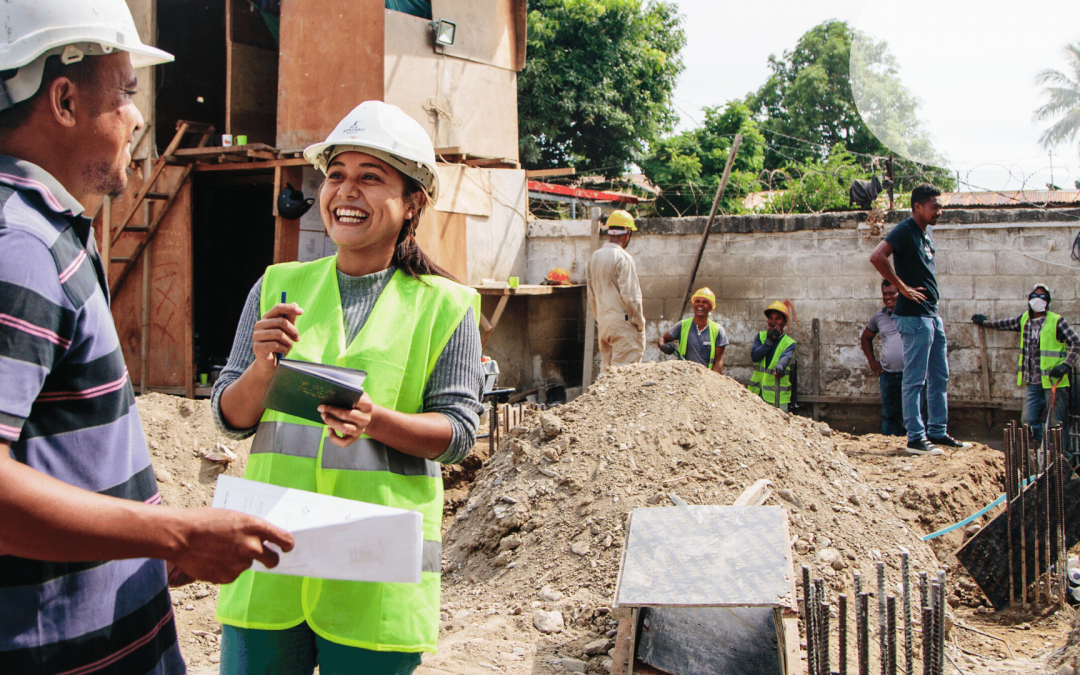By Sheila Mariana Artanti
On the 6th of October 2021, EWB NSW Chapter in partnership with the Women in Engineering, Engineers Australia Newcastle division, hosted an online webinar leveraging the findings from the 2018 EWB Australia report, ‘Engineering Redefined”.
The webinar, Engineering Redefined, ran in a panel discussion format and explored how to explicitly embed a social focus into engineering in order to attract and maintain diverse professionals into the industry.
We were delighted to be joined on the panel by industry professionals Dr. Gunilla Burrowes, Professor Anna Giacomini and Peter McArdle who shared their stories and insights on how to address the issue of diversity within the engineering workforce.
Transforming the Engineering Industry into a Diverse and Inclusive Workforce
The hour-long panel discussion was a robust conversation hosted by EWB NSW Chapter President Wenqian Gan. A key topic discussed was the importance of workplace culture in reimagining the industry:
“In my day, we had to change to fit into the workplace culture. This is why we haven’t been able to embed equality into the workplace agenda. Humans have a tendency to change adversely. We need to change our behaviour and our mindsets,” said Dr. Gunilla Burrowes, co-founder of Gender Matters and Honorary Fellow of Engineers Australia.
The panelists also discussed who is responsible for driving change in the sector:
“This idea about practicing your values, not just professing them I think applies to us very strongly. What I had to learn is it is not an easy lesson necessarily, that’s really uncomfortable sometimes and I’m speaking as a man in this space and I’m speaking particularly to other men is that you have to be willing to be uncomfortable.
If you’re actually going to practice social values, it’s going to be uncomfortable. And you have to be ready for that. If we’re going to respond to it, not just talk about it, we’ll have to make ourselves uncomfortable,” said Peter McArdle, EWB Board Member and Red Cross Operations Coordinator for COVID-19.
Dr. Gunilla Burrowes added that “One of the first steps is getting a language and structure and vocabulary that you’re willing to trust each other… We’re in a very opinionated world, where very few people will say they don’t have an opinion on that. But we do need to get to that point. We need to create a supportive environment to start exploring beliefs and views.”
Professor Anna Giacomini from the School of Engineering at the University of Newcastle emphasised that cultural change needs to come from both directions; “Students and young professionals go through a variety of issues related to diversity that are not solely about gender. They need to be able to talk to someone who understands, and also someone who can report and facilitate organisational change at a higher level.
Having an ally is fundamental, but for change to happen we need to have champions that enact the change first and set an example for others.”
Exploring the links between Human-Centred Engineering and Gender Diversity
In 2018, EWB Australia released the report, Engineering Redefined, which examined diversity in engineering and called for the sector to be reimagined. Amongst a range of findings, the report suggests that involving women in humanitarian and social projects could be key to getting more females involved in engineering.
The report found that motivation statements referring to ‘social-connectedness’ resonated much more strongly with women than men. It also found that shared values and understanding were the most prevalent motivators to getting involved in EWB education initiatives.
Articulating the relevance and potential impact of engineering to younger students was also found to be a motivator for university students when returning to their own classroom. Many initiatives which aim to attract and retain diversity in STEM fields already focus on the influence role models can have on others through, for example, providing a real example of what an engineering career path might look like. However, there are also clear benefits for the role models themselves, such as increased motivation stemming from building their own deeper understanding of their chosen career path.
“What we identified was that this conversation shouldn’t be limited to just women, we want to make clear how different people can become an ally and use their power to drive this conversation forward. To do that, there was a need to facilitate a forum to understand what individual concerns and existing institutional challenges there might be, and suggest ways to address them” said Wenqian, President of the EWB NSW Chapter.
Moving Forward
Whilst EWB doesn’t specialise in gender, we recognise that a diverse workforce brings many benefits to our org and the sector. To that end, we will continue the roll-out of the Diversity and Belonging Policy supported by Gender Equality Implementation Guidelines, take affirmative action through board quotas, develop supportive policies that encourage a diverse workforce and encourage the industry to continue its work in making the profession an environment where all are welcome.
Take Action
Everyone can do their part to improve gender diversity in the sector by:
-
- Supporting flexible-work policies: providing flexible work arrangements, such as parental leave. Support others who would take advantage of these opportunities.
- Model the right behaviors: be mindful of your words and actions. Make no assumptions about women’s challenges and roles.)
- Communicate fairly: ensure everyone is given equal opportunity to speak and participate.
Women can join Engineers Australia’s Women in Engineering group to shape the discourse within our profession. You can also get involved with EWB by joining your local Chapter.
If you’d like to read more about our research exploring the links between human-centred engineering and gender diversity, you can view the Engineering Redefined report available here.
If you missed the webinar, you can view the recording here.


